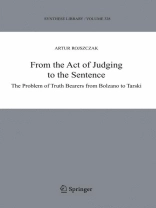IN MEMORIAM OF ARTUR ROJSZCZAK For a teacher, the opportunity to write the Foreword to a student’s work gives rise to a sense offul?lment and pride. In this case, however, although the latter remains, the former has been effaced.Inawell-ordered world Artur Rojszczak would have perhaps one day written tributes to ourselves. It isapoignant paradox when teachers are called upon to comment posthumously on thework of one of their students. This is a terrible task whichfalls to us—who have been not only mentors and colleagues to Artur, but also simply friends—of eulogizing someone who has died so soon, and so tragically. Artur was killed, together with his father, by an aggressive neighbour on September 27, 2001. Artur’s wife was severely injured in the same attack. Artur was born on March 12, 1968 in S?ubice (close to the Polish-German border). He studied in the Electronics College in Zielona Góra, graduating in 1987. But from very early on his dream was to study philosophy, and to do so at the Jagiellonian University in Cracow; no other place was considered by him seriously. He entered the university in 1988.
Содержание
Introduction: Alfred Tarski’s Philosophical Background in the Context of His 1933 Definition of Truth.- The Notion of the Truth Bearer.- Descriptive Psychology: The Theory of Judgement as the Theory of Cognition and Knowledge.- Judgement, Psychology, and Language.- The Ontology of Judgement.- Reism.- The Objectivity of Truth.- Ontologism, Abstract Objects and Nominalism.- Brentanism and the Background of the Semantics of the Lvov-Warsaw School.- Judgment, Belief, and Sentences: Remarks on the Truth Bearer in the Lvov-Warsaw School.- Final Comments.












